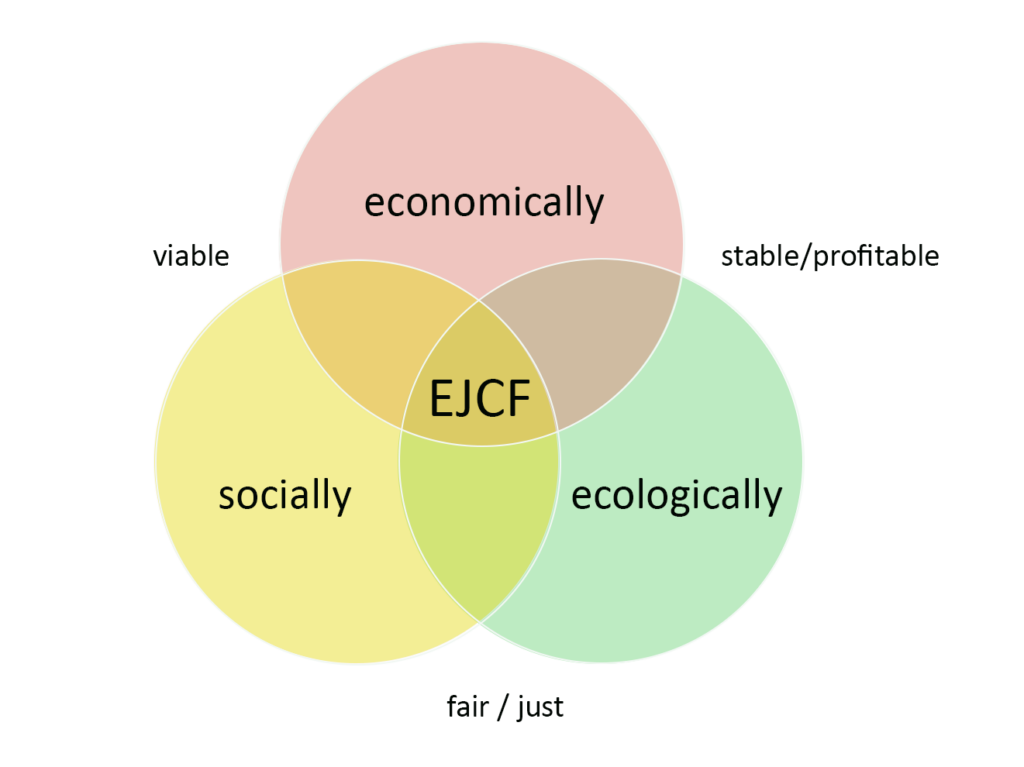We are committed to sustainability!
What is this about?
The city of Basel has set itself the ambitious goal of becoming climate-neutral by 2037. We at the EJCF consider it our duty, as part of the local cultural sector and as an international festival, to help protect the climate. We take our position as a role model seriously and want to become more sustainable!

What is our understanding of sustainability?
Alongside ecological responsibility, we also take economic performance and social solidarity into consideration.
Social sustainability
Ecological sustainability
Economic sustainability
What is our approach?
We assess all aspects of the festival with regard to sustainability, involve our employees in the process and set ourselves achievable goals. From these, we develop measures that are realistic and practical to implement. After the festival, we analyse what we have experienced, and check whether we have achieved our goals and whether our measures made sense.
The following list shows the areas in which we are currently taking action:
In the area of SOCIAL SUSTAINABILITY
- Involvement of the audience and low-threshold access to our programmes are important to us.
- The well-being of the participating choirs and volunteers is of central significance. (Do you want to become part of the EJCF family?)
- We use the ginto app to take into account the needs of people with mobility impairments and to make information about accessibility easier to obtain.
- We use gender-neutral language.
In the area of ECOLOGICAL SUSTAINABILITY
- We focus on recycling and upcycling (e.g. we recycle discarded office equipment and sew new products from old flags and banners).
- When working in cooperation with others, we give preference to sustainable producers.
- Choirs in Basel and the surrounding region mainly travel by public transport. As all venues are within walking distance of public transport, the audience can also reach them conveniently.
- We reduce van usage for transporting material, by using a cargo bike for short distances.
- We reduce the amount of meat that singers consume, by offering appealing veggie menus.
- We avoid generating rubbish and food waste (e.g. by means of EJCF water bottles, reusable crockery, water dispensers, donating surplus food etc.).
- We are starting to plan our printed resources more precisely, so that less material ends up as waste paper.
In the area of ECONOMIC SUSTAINABILITY
- We actively maintain relationships with other choir festivals, competitions, experts and choirs, at national and international level alike.
- We are broadening the scope of our cooperation with local and sustainable service partners, and we report on their efforts to enhance sustainability (EJCF GOES GREEN).
- We nurture relationships within our network, so that everyone wants to visit the festival and take part.
- We take a benevolent and supportive approach to the transfer of know-how on the part of our employees, thus enabling a generational shift within the team and securing motivated employees for the future.
- We are building up a circle of patrons who support the EJCF both ideologically and financially.
- We borrow or hire our event equipment whenever possible, thus saving on procurement and storage costs.
- We strive to be innovative and up to date, so as to keep reigniting the audience’s enthusiasm for the festival.
This list is neither complete nor exhaustive.